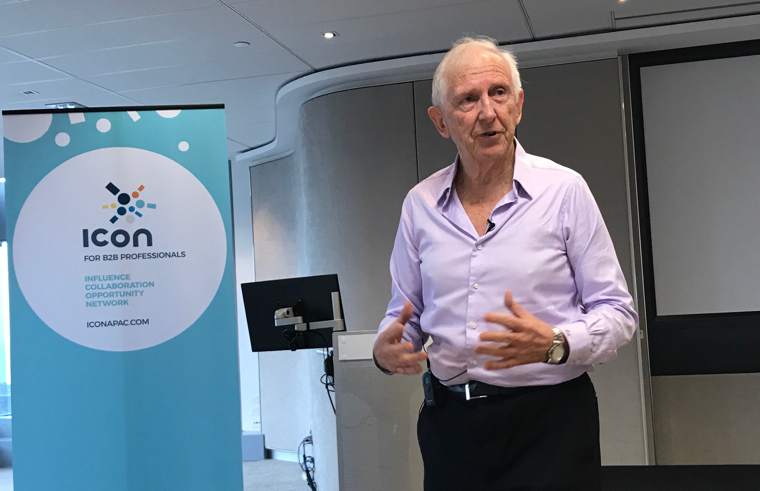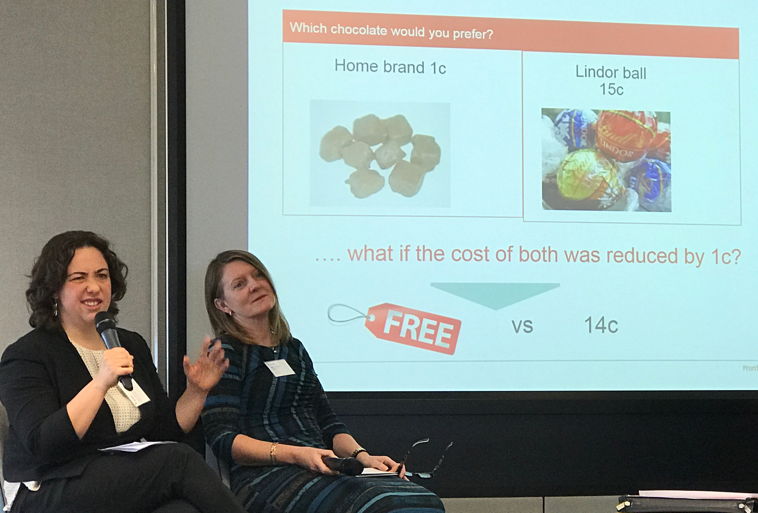My third brain wants to touch yours: why we like live events
By the Editor Group
"The future belongs to those who can form lasting relationships, not technocrats." That was the provocative opening line from psychologist and neurobiologist Dr Bob Murray to a thought-provoking day at ICON's inaugural full-day Melbourne Forum on 15 June 2017.
Organised by ICON's Victorian committee and hosted by Herbert Smith Freehills, the conference attracted about 60 members, featured more than 10 speakers and traversed themes ranging from digital disruption and storytelling to innovation, crisis communications, design thinking and professional motivation.
But why did we all really take a day out of our busy schedules to attend the forum? Was it the facts, figures and lessons on best practice? The chance to meet up with peers? The superb freshly cooked doughnuts at Herbert Smith Freehills or the even better drinks at Mon Bijou in Melbourne’s iconic Flinders Lane?
We'd all like to think it was the education, of course. And the day did deliver many insights.
To start with Dr Bob (as he's affectionately called), it seems we shouldn't be dazzled by technological advances. They won't differentiate our firms, he argued. Instead, we should focus on the reality that people are driven almost entirely by deep psychological needs for certainty, autonomy (control over the course of their lives), trust and status.

Dr Bob Murray, Principal, Fortinberry Murray
It turns out that the facts and figures of life only sway 1% of human interactions. Worse, 70% of the assumptions we make about situations are wrong, which is why we get on better with strangers than people we know (because we make less wrong assumptions about what the strangers are thinking). Consequently, professional service firms should concentrate most on the relationships they have with clients and the nature of the support they provide.
"We rush into technology but we’re not machines," said Dr Bob. "For the rest of your working lives – and certainly for the rest of mine – we'll be dealing with human beings not machines."
"Humans are about mutual support. Essentially, going forward, that's what you're going to be offering. Professional service firms, in the future, are going to be about support."
That's all very well, but where does that leave firms in practice today in 2017? The rest of the day provided numerous tips for how to interact with clients in a way that might go with the grain of their still largely prehistoric brains (of which we apparently have four, spread around our head, gut, skin and heart, said Dr Bob).
One good thing to do if you want to penetrate the anxious, self-interested and delusional fog that is a fellow human being's mind is to wrap your information in a Trojan horse of stories. "Stories are facts wrapped in context and delivered with emotion," said Mark Schenk, Managing Director of the storytelling consultancy Anecdote.
It's the context of a story – especially specific dates, places and characters – that help to make them concrete, memorable and trustworthy. The other key to stories' ability to improve comprehension and memorability is the emotional reaction we have when a character gets into trouble then the crisis is resolved – which is the plotline of most stories.
Another area to be conscious of how the mind works is pricing. And, given so little of human behaviour is remotely rational, there is plenty of scope for firms to come up with approaches that preserve their bottom lines and satisfy clients' true needs and wants.

Anna Wilson, Frontier Economics and Libby Maynard, Clayton Utz
Anna Wilson from Frontier Economics gave the example of an experiment where people are given the choice between a cheap chocolate for 1c or a nicer Lindor ball for 15c. Most people go for the Lindor ball, which they perceive to be better and fair value. But if you drop the price of each by 1c, the majority switches to the cheap chocolate because it’s now free. Deep down, humans love to get something for nothing and this quickly overrides common sense.
With this sort of reality in mind, the advice from the rest of the experts on the Melbourne Forum pricing panel was to focus on how pricing offers are framed and what clients really want or need, rather than too quickly agreeing to any requests for discounts.
Clayton Utz's Head of Pricing and Legal Project Management, Libby Maynard, said her firm regularly offered different packages to allow clients to find an approach that best suited their needs and preferences, but were financially neutral to the firm. She added that it was good to spell out savings offered and to keep high-quality records about how long projects took to deliver, to inform future pricing negotiations. Specialist pricing consultant Colin Jasper added that it was important to really explore how much clients cared about price and why.
Listening to Dr Bob, you might also assume it'd be good to take your clients for long coffees to understand their needs, bond and touch each other (which might sound weird and even creepy, but he says your skin brain grabs DNA from others when you touch them, and then thinks and remembers all sorts of things all by itself).
However, it seems modern-day clients might simply be too busy to sit down these days. Speaking on the client panel, Peter de Zwart, Deputy General Counsel at Newcrest Mining, said: "I don’t think anyone is looking for relationship coffees anymore."
Another panellist noted that a great way to deliver value to clients was to send any updates or newsletters with a covering note which highlighted the implications for that client’s organisation. A brief tailored message quickly demonstrates an understanding of that client's role and their operating environment.
The three client panellists agreed that business development and client management professionals could also play a key role in managing the relationship between firms and major clients. They cited examples such as BD professionals lining up experts from their firms to speak to executive teams and being a good first point of contact if they ever needed to raise concerns or discuss awkward issues.
Reassuringly, all three also felt there would always be a role for professional firms and human advisors where there was ambiguity in business and government situations. While they were happy to try alternative service delivery models and interested in what artificial intelligence and other technology-driven solutions might be able to deliver, they expected to continue relying on close relationships with their traditional advisors for some time to come.
Which neatly brings us back to the central theme of this report. What is the purpose of sitting on a chair all day in a room full of other people when we could network via LinkedIn and Facebook, or learn via any number of online sources, books and other materials?
Perhaps those technologically enabled forums just don’t fully meet our fundamental needs for what Dr Bob described as humans' number-one neurobiological priority: long-lasting and mutually supportive relationships with people we feel we have something in common with. Or put more simply, our desire to feel safe in a tribe so a lion can’t eat us.
Will social media prove to be the e-book of learning and networking – terrific in theory but surprisingly dissatisfying in practice? If so, we might be having ICON doughnuts and drinks, and our clients might continue needing our professionals and wanting to see them in person from time to time (and if not for coffee), for many more years to come.
Grant Butler is Managing Director of the corporate writing firm Editor Group, the former editor of then APSMA’s PSF Journal and the author of the book Think, Write, Grow (Wiley 2012) about thought leadership strategy and writing. Find him on LinkedIn, ironically.
![]()